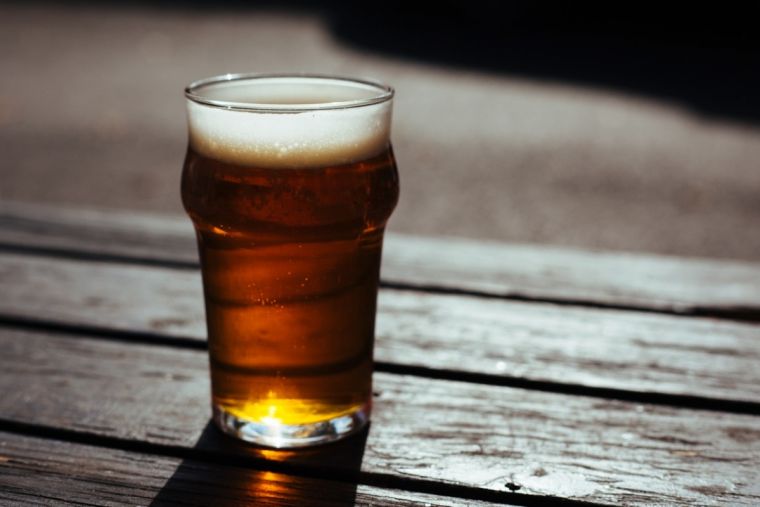Sleep better and lose weight: the health benefits of abstaining from alcohol

People who take part in Dry January not only report better health, they also continue to drink less alcohol for the remainder of the year, a new study has found.
After the excesses of Christmas, the charity Alcohol Change UK is challenging people to abstain from alcohol for one month as part of Dry January.
New research from the University of Sussex has found that those taking part enjoy considerable health benefits and that just one month of abstaining from alcohol has a lasting impact on their drinking habits.
The study, conducted by psychologist Dr Richard de Visser, looked at over 800 people who took part in Dry January in 2018.
He found that they were still drinking less alcohol half a year later in August and that their average drinking days had fallen from 4.3 to 3.3 per week.
And they were not only drinking less frequently; they were also drinking smaller quantities, with units consumed on drinking days falling from 8.6 to 7.1 on average. The frequency of being drunk also fell from 3.4 times per month to 2.1.
Over two thirds (70 per cent) said their health had improved as a result of taking part, with 71 per cent saying they had slept better and 67 per cent reporting more energy.
Over half (58 per cent) said they had lost weight and 54 per cent said they had better skin.
The participants also reported emotional benefits, with 93 per cent saying they had felt a sense of achievement and 57 per cent saying they had better concentration.
There was also a change in their attitudes towards drinking, with 71 per cent saying they realised that they did not need a drink to enjoy themselves and 80 per cent feeling more in control of their drinking by the end of the month.
Others said it had made them think more deeply about their relationship with alcohol (82 per cent) and that they had learned more about when and why they drink (76 per cent).
There were also practical benefits. The vast majority of participants (93 per cent) said they had felt a sense of achievement in taking part in Dry January, while 88 per cent said they had saved money.
Dr de Visser said: 'The simple act of taking a month off alcohol helps people drink less in the long term: by August people are reporting one extra dry day per week. There are also considerable immediate benefits: nine in ten people save money, seven in ten sleep better and three in five lose weight.
'Interestingly, these changes in alcohol consumption have also been seen in the participants who didn't manage to stay alcohol-free for the whole month - although they are a bit smaller. This shows that there are real benefits to just trying to complete Dry January.'
A new YouGov poll for Alcohol Change UK showed that one in ten drinkers in the UK - around 4.2 million people - are planning to take part in Dry January in 2019.
Dr Richard Piper, CEO of Alcohol Change UK, said: 'Put simply, Dry January can change lives. We hear every day from people who took charge of their drinking using Dry January, and who feel healthier and happier as a result.
'The brilliant thing about Dry January is that it's not really about January. Being alcohol-free for 31 days shows us that we don't need alcohol to have fun, to relax, to socialise. That means that for the rest of the year we are better able to make decisions about our drinking, and to avoid slipping into drinking more than we really want to.
'Many of us know about the health risks of alcohol - seven forms of cancer, liver disease, mental health problems - but we are often unaware that drinking less has more immediate benefits too.
'Sleeping better, feeling more energetic, saving money, better skin, losing weight... The list goes on. Dry January helps millions to experience those benefits and to make a longer-lasting change to drink more healthily.'
Smokers could also benefit from drinking less as a separate study by Sarah Dermody at Oregon State University and researchers at the Centre for Addiction and Mental Health in Toronto, Canada, found that cutting back on alchol can also help people quit smoking.
They studied a group of 22 daily smokers who were seeking treatment for alcohol use disorder and concluded that those who drink more have a harder time giving up cigarettes.
They observed that as the men in the group reduced their alcohol intake, their nicotine metabolism rate also fell, causing them to smoke less.
'It takes a lot of determination to quit smoking, often several attempts. This research suggests that drinking is changing the nicotine metabolism as indexed by the nicotine metabolite ratio, and that daily smoking and heavy drinking may best be treated together,' said Dermody.
'People with a higher ratio have a harder time quitting smoking cold turkey. They have are also less likely to successfully quit using nicotine replacement therapy products.'











